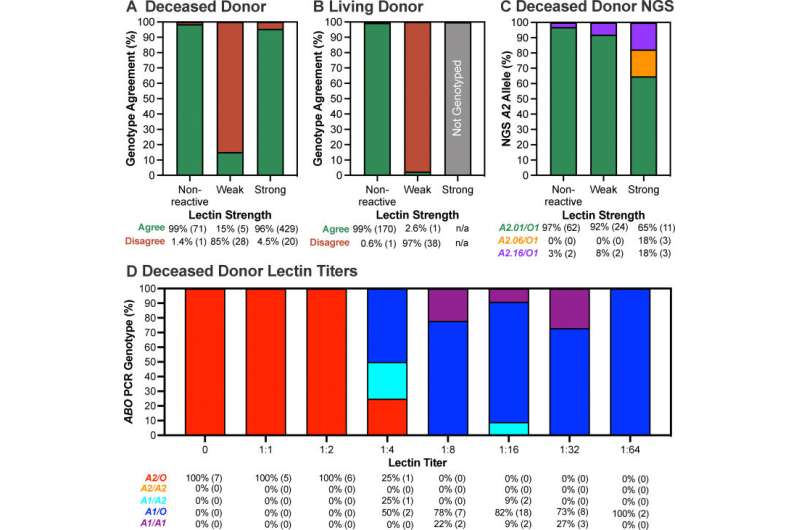This article has been reviewed according to Science X's editorial process and policies. Editors have highlighted the following attributes while ensuring the content's credibility:
fact-checked
peer-reviewed publication
trusted source
proofread
Genetic analysis of blood type may increase number of kidney transplant matches

ABO blood-type compatibility between organ donors and recipients is crucial for safe transplantations. Across the different ABO blood groups, longer wait-times for a kidney transplant are often experienced by patients who have type B blood because it is a less common ABO blood type, resulting in fewer donors.
Type B blood is more prevalent among Black and Asians individuals. Black African Americans are more likely to require kidney transplants than other groups, making the limited number of type B kidney donors a contributor to health inequities. Fortunately, research has shown that individuals with type B blood can safely receive kidney transplants from a subgroup of type A individuals (the A2 subgroup) who have reduced levels of the A antigen compared to other A individuals.
While current routine tests are not able to identify all A2 individuals, investigators at Brigham and Women's Hospital, a founding member of the Mass General Brigham healthcare system, and other collaborators have reported that genetic analysis can be used to identify up to 65 percent more A2 donors, thereby increasing the potential number of kidney transplantations for recipient candidates with blood type B each year. Results are published in American Journal of Transplantation.
"ABO blood type incompatibility between patient and organ donor is still the third largest contributor to transplant inequity among minorities," said corresponding author William Lane, MD, Ph.D., of the Department of Pathology. "By introducing genotyping technology, we can better serve the type B individuals in the transplant system and reduce wait-list times."
Currently, A subtyping is largely performed with a lectin assay, a test that uses a plant-derived protein to determine how much A antigen an individual produces. Researchers from Brigham and Women's Hospital and Southwest Immunodiagnostics analyzed over 750 samples from type A kidney donors at the two centers, sub-typed with both lectin tests and genetic tests.
In collaboration with researchers from the New York Blood Center, an additional 124 samples with inconclusive lectin testing were incorporated into the study to further examine discrepancies between lectin testing and genotyping. Samples were also reviewed by co-authors at Lund University Hospital to further confirm and refine subtyping.
Overall, findings from this multi-center study suggest that current lectin typing may under-report the actual number of A2 individuals among type A kidney donors. In particular, the researchers found that deceased donors are not identified as A2 individuals as frequently as living donors because some of these individuals have received blood transfusions from type A1 (non-A2) individuals. Because the A2 subtype is determined by one genetic change in 98 percent of cases, genotyping can be a more precise way of identifying A2 individuals who have variability in A-antigen levels.
Work is currently underway to show that type B recipients can safely and effectively receive kidney transplants from A2-genotyped individuals. Although genotyping is not yet widely available, the authors believe that genotyping can supplement existing testing whenever a donor has been transfused or lectin testing is inconclusive, and with demonstrated efficacy may eventually be approved as the test of record for subtyping.
"Genotyping is a more specific assay for overcoming limitations with current testing," Lane said. "Transplantations are always a balancing act of resources, but by using this technology, we may be able to shift more donors toward an underserved area of candidates waiting for transplants."
More information: Abigail Joseph et al, ABO Genotyping Finds More A2 to B Kidney Transplant Opportunities Than Lectin Based Subtyping, American Journal of Transplantation (2023). DOI: 10.1016/j.ajt.2022.12.017



















